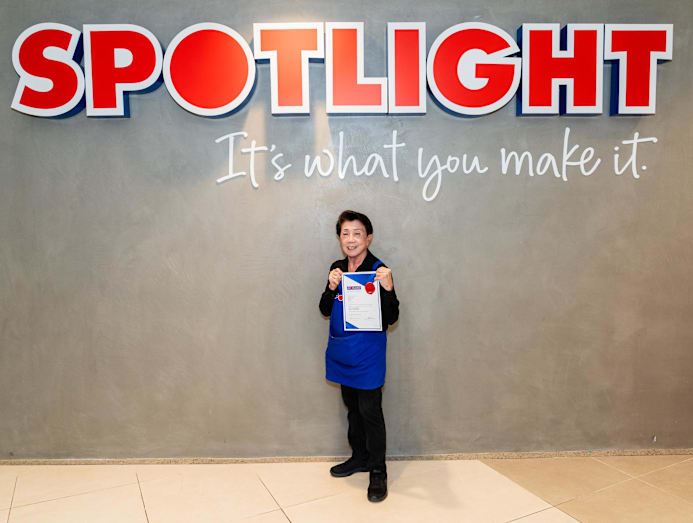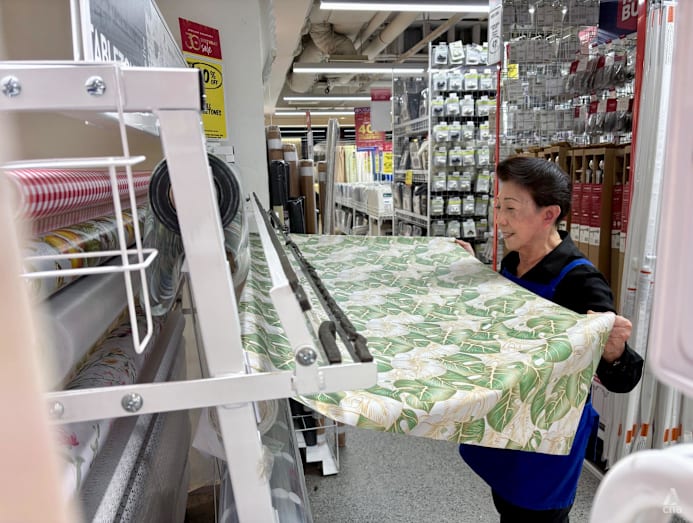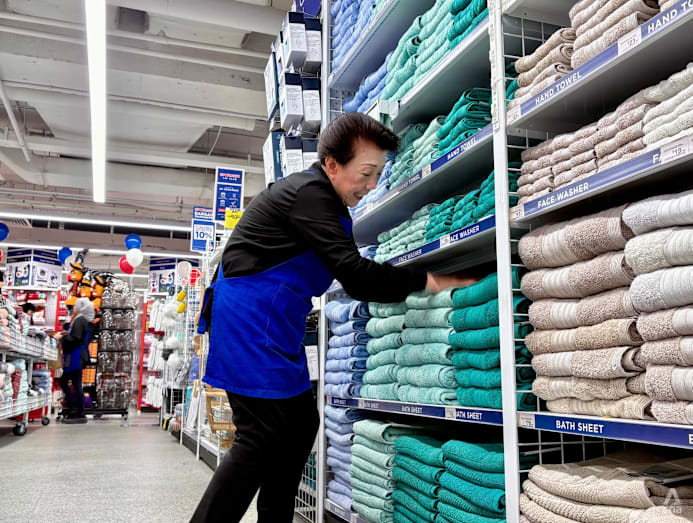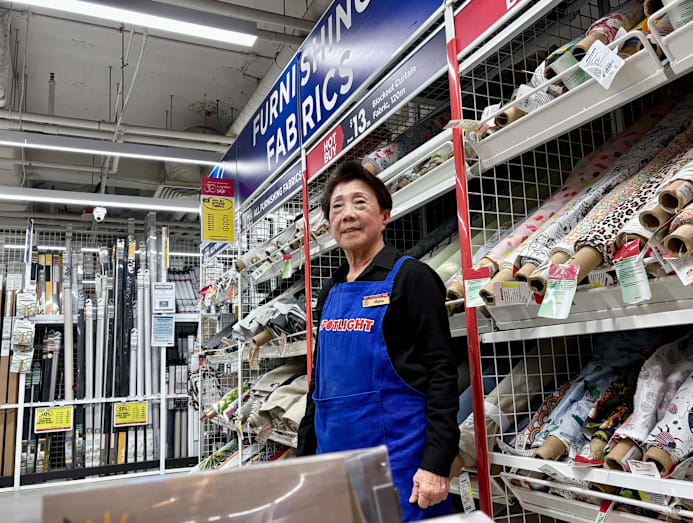Pak Mee Lin has held various roles at Australian retailer Spotlight since it opened in Singapore in 1995, from team leader of the craft department to her current job as a cashier – and she still finds joy in meeting different people every day.
An employee since 1995 when Australian retailer Spotlight opened in Singapore, 75-year-old Pak Mee Lin, better known as Melia Pak, is the craft and home decor store’s longest serving employee. (Photo: CNA/Grace Yeoh)
New: You can now listen to articles.
This audio is generated by an AI tool.
09 Nov 2025 07:24AM
As the Taylor Swift phenomenon swept through Singapore in 2024 with The Eras Tour, Pak Mee Lin had a front-row seat to the powerful ripple effects of pop culture.
At Spot…
Pak Mee Lin has held various roles at Australian retailer Spotlight since it opened in Singapore in 1995, from team leader of the craft department to her current job as a cashier – and she still finds joy in meeting different people every day.
An employee since 1995 when Australian retailer Spotlight opened in Singapore, 75-year-old Pak Mee Lin, better known as Melia Pak, is the craft and home decor store’s longest serving employee. (Photo: CNA/Grace Yeoh)
New: You can now listen to articles.
This audio is generated by an AI tool.
09 Nov 2025 07:24AM
As the Taylor Swift phenomenon swept through Singapore in 2024 with The Eras Tour, Pak Mee Lin had a front-row seat to the powerful ripple effects of pop culture.
At Spotlight, where she’s worked since 1995, business was brisk in the craft section. Batches of beads, in particular, flew off the shelves because fans were making and trading friendship bracelets.
The trend among Swifties is said to have originated from the song You’re On Your Own, Kid off Swift’s 10th studio album Midnights, released shortly before The Eras Tour kicked off globally. “So make the friendship bracelets, take the moment and taste it,” she sang – and fans did exactly that.
The bracelets often spell out song lyrics, titles and inside jokes within the fandom. So alphabet beads were in high demand, recalled Pak.
And in the end, “wah, really, you know, we sold out“, said the diminutive 75-year-old, who goes by the name Melia. Customers had to wait for more stock to come in.
Such emptied shelves were less common, if at all, when Spotlight first opened in Singapore at Orchard Point in 1995. It was also the Australian retailer’s first store in Asia.
Initial customers weren’t familiar with the brand as a fabric and craft store, Pak recalled. Some thought the store sold light bulbs. (Who could blame them?)
But she was game to be their guide, taking the initiative to become acquainted with the entire store’s comprehensive selection beyond the craft department where she was assigned.
Even when she later became a cashier, she would still “go all around” the store, she said. “If a customer needs help and if there are not many customers at the counter, I will guide them to what they need.”
She had hospitality in her genes (and resume) after all, having worked in customer service first at her brother’s restaurant in Australia then as a cashier at Raffles Hotel for three years.
So when a friend suggested she try for a role at Spotlight, then a new brand in Singapore, she thought: Why not?
“STEADY RISE” OF SINGAPORE’S CRAFT SCENE
Thirty years and one global pandemic later, the brand has established itself as a mainstay in the local DIY (Do-It-Yourself) and crafting community. It relocated from its original premises to Plaza Singapura’s larger space in 2002.
The Eras Tour effect would’ve been more surprising if not for the “steady rise” of Singapore’s craft and fabric scene since the pandemic’s early years.
The strongest growth at Spotlight has been in yarn for knitting and crochet, home and programmable sewing machines, electronic cutting tools, polymer clay and jewellery-making materials, revealed Chon Swee Mei, the brand’s Asia product manager.
Driven by “makers and small brands embracing DIY and personalised projects”, as well as work-from-home arrangements, this post-pandemic lifestyle shift has encouraged “new habits”, like home improvement and “hands-on creative pursuits”, she shared.
At the same time, Spotlight has seen the rise of a “hybrid trend” where technology complements traditional making, making digital crafting tools a “defining feature of today’s modern craft movement”.
 Melia received her long service award during Spotlight’s 30th anniversary celebrations on Oct 21, 2025. (Photo: Spotlight)
Melia received her long service award during Spotlight’s 30th anniversary celebrations on Oct 21, 2025. (Photo: Spotlight)
And Pak, as Spotlight’s longest-serving employee today, has seen these shifts on the ground too.
In the past, yarn and craft-related materials “didn’t move at all”, she said. The hot items were bedsheets and towels.
“Now, it goes the opposite way,” she mused.
Among the yarn enthusiasts in 2025? Students who need it for school projects, hobbyists drawn to the appeal of making a new sweater and shawl from scratch, doomscrolling addicts searching for an offline escape – and notably, a growing pool of givers.
“Some people don’t work, so they’re very free at home,” she said. “(They) buy yarn to knit for charity or make toys to give away as presents.”
 Assisting customers with their crafting and home decor needs brings Melia joy on the job. (Photo: CNA/Grace Yeoh)
Assisting customers with their crafting and home decor needs brings Melia joy on the job. (Photo: CNA/Grace Yeoh)
AN ENDURING LOVE FOR CUSTOMERS
What has seemed to remain, however, is Pak’s enthusiasm for customer service. While showing me around Spotlight on a weekday afternoon in October, she was evidently employee first, interviewee second.
Running into customers who seemed lost, she paused our tour to offer them help. Her interactions with apparent strangers was akin to old friends catching up, and with familiar faces, bumping into the affable employee brought both parties joy.
A pair of elderly retirees with a basketful of yarn in tow – raw material for gifts meant for charity beneficiaries – happily added another skein to their collection, after Pak recommended a different shade of green to match the mood of the upcoming Christmas festivities.
A tad taciturn while recounting her job scope earlier in the day, she lit up when talking to customers. And the feeling was clearly mutual.
It’s no surprise that she also has long-timers, who’ve journeyed with her since the start, return to the store with their children.
“They don’t (always) buy things but they will also come and say hello to me and ask what’s on offer. Sometimes their children don’t have a membership number, so they will use their mother’s number (and tell me), ‘My mother shops here a lot,’” she shared.
“I feel happy. They can recognise me after so long; they still remember me.”
DEDICATION TO PERSONALISED, HUMAN TOUCH
Having cut my teeth in part-time retail work as a student, I know it takes a certain personality and stamina to find genuine enjoyment in serving customers.
It’s a particular passion for hospitality that extends beyond fulfilling a person’s request, but anticipating their needs.
For this reason, Pak has a “trick” to memorising, say, which aisle a particular brand of yarn sits or which bedding is most suitable for a customer’s needs.
“My trick is, when I’m free, I will walk around (the store),” she said plainly.
“Then I can assist the customers by helping them (with their queries) next time, even if I cannot walk (away from the) counter. Like I can tell you (that you can find) yarn if you walk this way down, it’s on your left, the last four lanes.”
Occasionally, she even finds herself jumping in to assist new staff who are still familiarising themselves with the store layout – a force of habit not meant to offend.
“Maybe because I’m impatient, the new staff (will have) customers asking them questions (about where a product can be found), then I will (open) my mouth (to answer). I’ll say it’s over there and it’s under which lane,” she admitted.
At least, her willingness to help has defused one irate customer, who was sent to her counter – only to later realise it was because she could point him in the right direction, and not because she had the product he was looking for.
Where possible, she accompanies such customers to the aisle personally, resulting in remarks from a few that they’re impressed she can remain “cool” despite having to deal with somewhat unreasonable behaviour.
But it is not a feat worth bragging about to her, as maintaining such an attitude is simply part of a frontline worker, she said, smiling.
 Touted as a “walking dictionary” by her colleagues, Melia knows probably more about bath towels than humanly necessary. (Photo: CNA/Grace Yeoh)
Touted as a “walking dictionary” by her colleagues, Melia knows probably more about bath towels than humanly necessary. (Photo: CNA/Grace Yeoh)
So, despite technology today that might be able to give customers basic information, such as whether an item is in stock, Pak sees her role as essential to customer satisfaction.
She’s even directed some to so-called competitors, like Japanese lifestyle store Daiso (on the same floor of the mall) and other neighbouring shops, when Spotlight doesn’t have what they need.
“Sometimes they come in very blur and don’t know what they’re looking for. Then we open the way for them. I will ask why they buy so many things (and) for what purpose, so I know what they will come back for,” she added.
“They always come back for the same thing – just (in a) different colour,” she added, cheekily.
And those who do return are, in fact, often “satisfied” with her recommendations and specially request that she attend to them again.
The vast range of products at Spotlight means long-standing employees like Pak are even more necessary, coming with “invaluable knowledge of both products and processes”, noted Chon, the product manager for Asia.
They ensure customers receive “accurate guidance and support” for any project they wish to create. And their ability to provide “personalised advice”, as well as their “creativity and practical experience”, is something “technology cannot replicate”.
 Melia worked at Raffles Hotel for three years in customer service before she joined Spotlight Singapore in 1995. (Photo: CNA/Grace Yeoh)
Melia worked at Raffles Hotel for three years in customer service before she joined Spotlight Singapore in 1995. (Photo: CNA/Grace Yeoh)
RETIREMENT? NOT NOW
Nonetheless, if one were to wager whether technology or age would come for her job first, it certainly wouldn’t be the latter.
Her decades-long career at a single company begs the question: Has she ever thought of moving?
And without missing a beat, she answered, “I don’t want I like it here”, before I could finish my sentence.
“My relationship with my colleagues is very good. Whether (they’re) younger or older, I can mix around. I like the environment here; the bosses don’t always come and pick on you. And I also (get) to learn a lot of things.”
No two days are the same – and she’s not about to give up her key source of excitement or enjoyment.
“I won’t retire, (unless) I can’t work and I can’t stand. But now, I still feel energetic,” she said, brushing off my concerns about the toll of the physically intensive retail role.
“Coming to work, I feel alive. I don’t feel tired. I don’t feel it’s boring. I can see a lot of different people, and different people ask me different things. The days pass very fast – eight hours gone, I go home.”
Yet, after 30 years, some 262,980 hours have passed, and Pak, with the same vim and vigour, is still here.
Source: CNA/gy